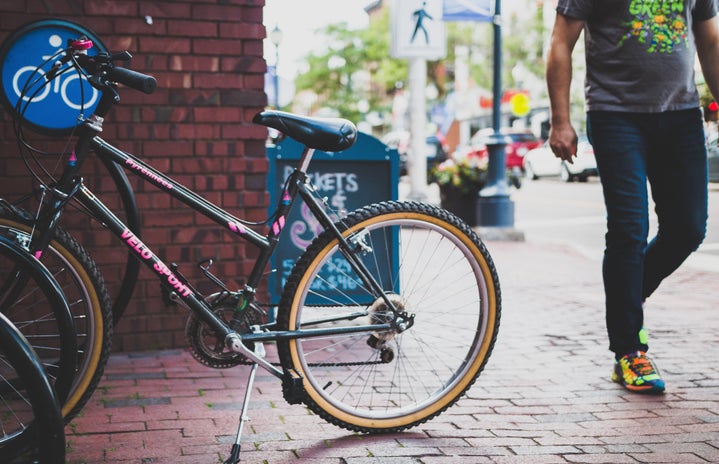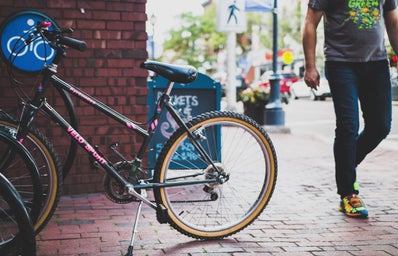This article describes Spencer McCullough, the author’s brother.
It’s a typical day in the life of Spencer McCullough. After waking up around eight A.M., he enjoys a breakfast of three bagels with cream cheese, two grocery store donuts, an apple and a banana. When he’s not feeling frugal, he buys a kombucha as well. Around ten he hops on his bike and begins his ride. In the crisp air of Klamath Falls, Oregon, he rides past the beautiful sites of the Link River and Lake Ewauna. Cold air rushes past his face, turning his nose red and making his eyes water. Despite this slight discomfort, he enjoys the brisk fall day. At the next intersection, he pops in a wired earbud and turns on one of his favorite podcasts, This American Life. However, where a typical ride might be five to ten miles for most people, he’s got 70 left just for today. Traveling from Oregon to California over the course of a few days, he rides quickly. Winter is beginning to set in around the country and he has to reach many parks sooner than later, or risk being stuck in impending snowstorms.
For the past 221 days, Spencer has been riding his bike across the country. His ultimate plan: visit all 51 national parks in the lower 48 states. Spurred on by the harrowing effects of climate change, he wants to see the parks before their beauty is irrevocably changed. His trip is a race against the clock, both against climate change and the seasons.
Despite this extraordinary feat, he once lived a rather ordinary life. Growing up in the suburbs of Yardley, Pennsylvania, he was a star soccer and volleyball player in high school and went on to row at Penn State. He chose to study finance, but eventually switched to pursue information sciences and technology. By all accounts, Spencer’s life was on track. That is until he decided to drop out, move to Colorado, modify and live in a van for a few years, work for a tech company, quit his job, and then set out on a solo bike trip.
Although he travels alone, Spencer is sometimes joined by fellow cyclists he meets along the way. A few friends have even joined when he passes through the areas in which they now live. He documents his trips on his website (OneLongTrip.Bike) and his Instagram page (@spencexyz). Even though he’s just one man, he’s hoping his story can make a difference. He wants to highlight the effects of climate change on our National Parks with his journey. He hopes that if he starts small, maybe it’ll get people to care about the bigger picture.
As the “About” page of his website reads: “This trip was originally intended to be a wake for the National Parks…While I’m still focused on holding space for myself to grieve this immense loss, I have come to believe that mourning a public treasure should not be a private affair. I want to talk about it with others…”
Already, he’s begun seeing the effects of climate change in person. As one of the many stops on his trip, he visited Glacier National Park. Riding up to the campsite on his bike, he was prepared to be amazed by the park’s signature glaciers. Instead, he was left disappointed. What used to be a picturesque landscape, was now melting away. Within decades, Glacier National Park could lose its namesake glaciers entirely. Since 1966, all of the park’s glaciers have gotten smaller, with some having lost as much as 80 percent of their area. From Montana he traveled westward, eventually making his way through Oregon and into California.
On a long stretch of highway in California, he’s stopped by a flagger. Looking ahead he sees that only one lane remains open. Pulling his bike off to the side he waits for it to be his turn. The leaves on the trees are giving way to the signs of fall. The tops of them turning to a bright orange, while the inside remains green with summer. Not much farther up the road, a different scene emerges. The reason for the road closure, fire mitigation crews, lies ahead. Wildfires have been burning through much of the United States, especially California. This area, too, had succumbed to the unseasonably dry and hot weather. The charred remains of trees are cut down as Spencer passes on his bike. The acrid smell of smoke still hangs in the air, though it’s grown fainter. The crew was removing burned trees to prevent them from falling on the road. He knew they’d been doing this kind of work for months, but to see it was something else.
While wildfires are a natural occurrence, the number of wildfires in the US has increased dramatically. From 1984 to 2015, human-caused climate change has doubled the area burned by wildfire in the western United States compared to what would have burned naturally. The results are detrimental to both wildlife and people, as lower air quality affects health and visibility. There’s already been up to an 80 percent decrease in average summer visibility in the Great Smoky Mountains since the 1950s. According to the EPA, the biggest human activity contributing to climate change in 2021 was transportation. Making up 28 percent of the total, the greenhouse gas emissions from transportation were mainly caused by the burning of fossil fuels. These kinds of statistics were a big deciding factor in the most important part of Spencer’s trip: his bike. It would be hypocritical to pay respect to the National Parks as they continue to die out due to climate change via car.
As he puts it, “Riding your bike is climate activism. Taking the bus is climate activism. If I can get one more person to start biking, or bussing, or attending their local advocacy group meetups, then this ride will be a success for me.”
Even before this trip, Spencer had been advocating for better bike lanes and improved protection for cyclists for years. It started small with just him voicing his general opinion and sharing the occasional Instagram post to his story. However, this trip has enabled him to spread the word further and connect with a bigger audience. Though still modest, his following has grown to over 1,000 people on Instagram. Plus, his story has been covered in online publications like the Missoulian, The Bucks County Herald, the Cook County News Herald, along with several others. When he lived out of a van, Spencer frequently opted to ride his bike throughout the city of Denver, rather than move his vehicle.
Using his Instagram platform, Spencer has been documenting the challenges he’s faced during this entire trip. He has been lucky to find many hosts on Warm Showers who’ve provided him lodging on his trip. Warm Showers is a non-profit that allows people on bicycle tours to connect with those willing to provide them with free housing for a night or two. Without Warm Showers hosts, his alternative is to camp. When it comes to camping in the parks, however, one key issue he has is with the entrance fees. In Yellowstone National Park, it costs a single person entering on their bike $20. It would only cost $35 for a family of four in a massive RV. Instead of incentivizing the use of smaller, less gas-guzzling vehicles, these prices are doing the opposite. It would be cheaper for two cyclists to simply take a car in together than it would be to camp from their bikes. This kind of pricing is ironic, since the parks are, in a way, contributing to the very climate change altering their landscapes. By shining a light on this, Spencer is aiming to spark a conversation and get fundamental issues like this one altered.
Nine flat tires and 9,633 miles later, Spencer is over halfway through his journey. Racing against the weather and time, he hopes to reach the remaining 24 parks and finish his trip within the next year. By reaching out to local newspapers along his route and sharing his trip on social media, Spencer is hoping to spread his message of climate awareness. Recognizing that inciting change as an individual is a challenge, his goal is to incite that change in as many others as possible.


